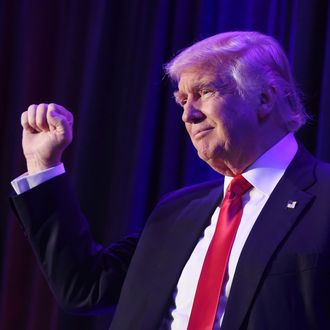
The long list of reasons why Donald Trump beat Hillary Clinton last November should not include the rash of false stories spread largely through social media, commonly referred to as “fake news,” according to a study to be published Monday.
Entitled “Social Media and Fake News in the 2016 Election,” the research from professors at Stanford and NYU found that even though false stories that favored Trump far outnumbered those favoring Clinton, their impact was negligible. “Only a small fraction of Americans” saw the stories, the paper says, and an even smaller group actually believed them.
The study, which relied on web-browsing data and a post-election survey of 1,200 people, also found that the impact of social media in general tends to be overstated. In fact, wire services and local TV news remain a more popular source of information than partisan cable-news networks and websites that conjure their stories out of thin air. In short, no matter how much social media seemed to be driving the conversation during the 2016 election, the report says, TV was “more important by a large margin.”





























